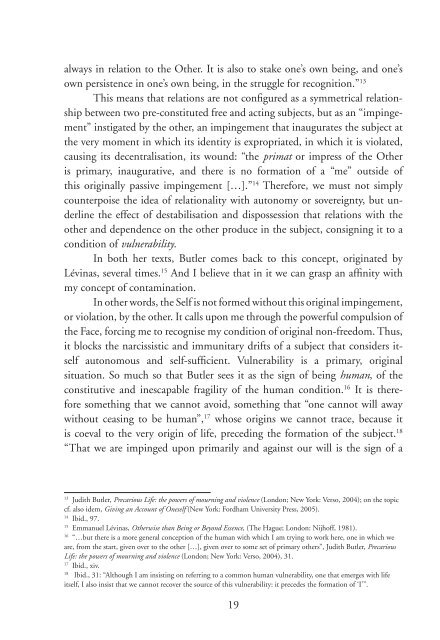Teaching Subjectivity. Travelling Selves for Feminist ... - MailChimp
Teaching Subjectivity. Travelling Selves for Feminist ... - MailChimp
Teaching Subjectivity. Travelling Selves for Feminist ... - MailChimp
Create successful ePaper yourself
Turn your PDF publications into a flip-book with our unique Google optimized e-Paper software.
always in relation to the Other. It is also to stake one’s own being, and one’s<br />
own persistence in one’s own being, in the struggle <strong>for</strong> recognition.” 13<br />
This means that relations are not configured as a symmetrical relationship<br />
between two pre-constituted free and acting subjects, but as an “impingement”<br />
instigated by the other, an impingement that inaugurates the subject at<br />
the very moment in which its identity is expropriated, in which it is violated,<br />
causing its decentralisation, its wound: “the primat or impress of the Other<br />
is primary, inaugurative, and there is no <strong>for</strong>mation of a “me” outside of<br />
this originally passive impingement […].” 14 There<strong>for</strong>e, we must not simply<br />
counterpoise the idea of relationality with autonomy or sovereignty, but underline<br />
the effect of destabilisation and dispossession that relations with the<br />
other and dependence on the other produce in the subject, consigning it to a<br />
condition of vulnerability.<br />
In both her texts, Butler comes back to this concept, originated by<br />
Lévinas, several times. 15 And I believe that in it we can grasp an affinity with<br />
my concept of contamination.<br />
In other words, the Self is not <strong>for</strong>med without this original impingement,<br />
or violation, by the other. It calls upon me through the powerful compulsion of<br />
the Face, <strong>for</strong>cing me to recognise my condition of original non-freedom. Thus,<br />
it blocks the narcissistic and immunitary drifts of a subject that considers itself<br />
autonomous and self-sufficient. Vulnerability is a primary, original<br />
situation. So much so that Butler sees it as the sign of being human, of the<br />
constitutive and inescapable fragility of the human condition. 16 It is there<strong>for</strong>e<br />
something that we cannot avoid, something that “one cannot will away<br />
without ceasing to be human”, 17 whose origins we cannot trace, because it<br />
is coeval to the very origin of life, preceding the <strong>for</strong>mation of the subject. 18<br />
“That we are impinged upon primarily and against our will is the sign of a<br />
13<br />
Judith Butler, Precarious Life: the powers of mourning and violence (London; New York: Verso, 2004); on the topic<br />
cf. also idem, Giving an Account of Oneself (New York: Fordham University Press, 2005).<br />
14<br />
Ibid., 97.<br />
15<br />
Emmanuel Lévinas, Otherwise than Being or Beyond Essence, (The Hague; London: Nijhoff, 1981).<br />
16<br />
“…but there is a more general conception of the human with which I am trying to work here, one in which we<br />
are, from the start, given over to the other […], given over to some set of primary others”, Judith Butler, Precarious<br />
Life: the powers of mourning and violence (London; New York: Verso, 2004), 31.<br />
17<br />
Ibid., xiv.<br />
18<br />
Ibid., 31: “Although I am insisting on referring to a common human vulnerability, one that emerges with life<br />
itself, I also insist that we cannot recover the source of this vulnerability: it precedes the <strong>for</strong>mation of ‘I’”.<br />
19

















